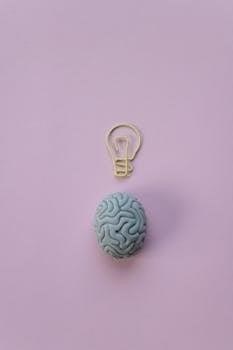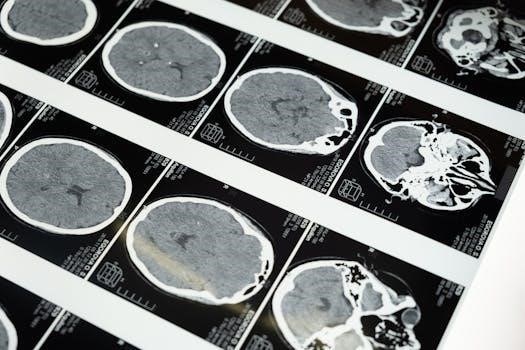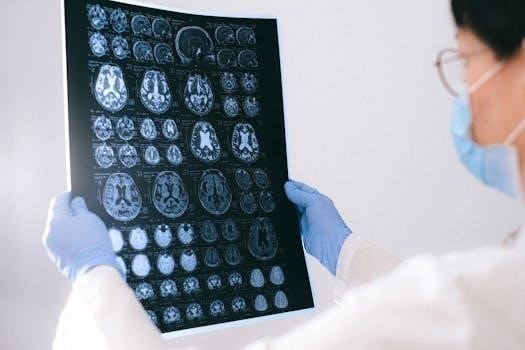Understanding “Fry the Brain”⁚ Cognitive Fatigue
Feeling “brain-fried” is a colloquial expression for what neurologists call cognitive fatigue; It’s a state of mental exhaustion that most people experience. This can arise from intense mental exertion, like taking a long exam, or overstimulation from technology use.
What is Cognitive Fatigue?
Cognitive fatigue, often described as “brain fog” or feeling “brain-fried,” is a state where the brain feels overworked and strained. It’s characterized by a subjective feeling of mental tiredness, reduced alertness, and impaired cognitive performance. This condition can manifest in various ways, including difficulty concentrating, feeling dazed and confused, and a general lack of motivation. While it’s not a formal medical diagnosis, cognitive fatigue reflects a real experience of mental exhaustion that can significantly impact daily life and productivity, stemming from prolonged mental effort or overstimulation.

Causes of Cognitive Fatigue
Cognitive fatigue stems from various sources. These can include overstimulation, lack of sleep, stress, overwork, and poor nutrition. Identifying the root cause is crucial for implementing effective strategies to combat the feeling of a “fried” brain.
Overstimulation and Technology Use
In today’s digital age, overstimulation is a primary contributor to cognitive fatigue. Constant exposure to screens, notifications, and information overload can overwhelm the brain’s processing capacity. This frequent dopamine hits and stress responses alter neural pathways. This can lead to a state of mental exhaustion, often described as a “fried” brain, making it difficult to focus and think clearly. Taking breaks from technology is essential for cognitive recovery.
Lack of Sleep
Insufficient sleep profoundly impacts cognitive function, contributing significantly to cognitive fatigue. When you don’t get enough sleep, your brain doesn’t have the chance to rest and recover from the day. This lack of rest impairs memory consolidation, attention, and overall cognitive performance. Chronic sleep deprivation can lead to cognitive decline, mood swings, and an increased susceptibility to feeling mentally “fried.” Prioritizing adequate sleep is crucial for maintaining optimal brain health and preventing cognitive fatigue.
Stress and Overwork
Prolonged exposure to stress and excessive workload are major contributors to cognitive fatigue. When constantly under pressure, the brain’s resources become depleted, leading to burnout and mental exhaustion. The stress of uncertainty and worry is inducing fatigue. Cynicism, apathy, and trouble focusing can all be signs of an overworked brain. It’s crucial to manage stress effectively and avoid overworking to protect cognitive function. Taking breaks, practicing mindfulness, and seeking support can help mitigate the effects of stress and prevent cognitive overload.
Poor Diet and Nutrition
A diet lacking in essential nutrients can significantly impact cognitive function and contribute to fatigue. The brain requires specific nutrients to function optimally, and deficiencies can impair its ability to process information efficiently. The oil clogs up the arteries. When you eat the fatty foods, you will eat less food overall. Consuming deep-fried oils has been linked to oxidative stress and inflammation, which are risk factors for neurodegenerative diseases. Therefore, focus on consuming a balanced diet rich in vitamins, minerals, and antioxidants to support brain health and combat cognitive fatigue.

Symptoms of Cognitive Fatigue
Cognitive fatigue manifests in several ways, including feeling dazed and confused. Other symptoms include difficulty concentrating, lack of motivation, and slowed thinking. Recognizing these signs is crucial for addressing the underlying causes.
Feeling Dazed and Confused
One of the primary indicators of cognitive fatigue is a persistent feeling of being dazed and confused. This symptom often manifests as difficulty processing thoughts or sensory input. Individuals may experience disorientation, struggle with decision-making, or find themselves in a blank mental state. The feeling can be overwhelming, making it hard to perform everyday tasks. This symptom arises from imbalances and reduced blood flow in the brain.
Difficulty Concentrating
Another common symptom of cognitive fatigue is a noticeable difficulty concentrating. This manifests as an inability to focus on tasks, even those that were once simple. The mind may wander easily, leading to decreased productivity and increased frustration. Memory problems may also arise, making it hard to retain new information. This struggle to concentrate can significantly impact both work and personal life; An overworked brain can result in this symptom.
Lack of Motivation
Cognitive fatigue often leads to a pronounced lack of motivation. Tasks that once seemed interesting or rewarding now feel overwhelming and undesirable. This can result in procrastination, avoidance of responsibilities, and a general sense of apathy. The individual may struggle to find the energy or enthusiasm to engage in activities they previously enjoyed. This lack of motivation can further exacerbate feelings of burnout and contribute to a negative cycle of reduced productivity and diminished well-being, ultimately requiring intervention to break free from this state.

The Impact of Drugs and Alcohol
Substance use can significantly alter brain function, sometimes irreversibly. Drugs and alcohol can cause neurological complications. However, some drug and alcohol-related brain changes can improve with abstinence, though there are exceptions to this.
LSD and “Permafried” Brain
The term “permafried” refers to alleged permanent brain damage from LSD, although there’s no definitive proof acid kills brain cells. Despite the lack of evidence that it fries the brain, it is important to acknowledge that LSD use can have long-term psychological consequences. Bad trips can cause lasting anxiety or mood swings, and can cause disturbing hallucinations. Permafried is a non-medical colloquialism and should not be taken as the absolute truth.
Ecstasy and Brain Damage
Ecstasy, also known as MDMA, has been shown to cause lasting damage to the brains of lab animals. Studies suggest that ecstasy can lead to neurotransmitter imbalances and reduced blood flow. These changes can cause feelings of confusion and daze. Ecstasy can affect serotonin and dopamine levels in the brain. These neurotransmitters affect mood and pleasure. It’s important to be aware of the potential risks of ecstasy use. The long-term effects of ecstasy use remain an area of active research.
Crack Cocaine and Cognitive Decline
Crack cocaine is a highly addictive drug that can have devastating effects on cognitive function. Crack cocaine use can cause significant cognitive decline. This can lead to long-term damage. The drug can affect blood flow to the brain, causing cell damage. Some users describe feeling “fried” after prolonged crack use. Crazy Bill confided that his downfall was smoking crack. This highlights the real-world impact of crack cocaine on individuals. The drug’s effects can lead to serious cognitive and behavioral problems.
The Role of Diet
Diet plays a crucial role in brain health. Fatty foods, saturated fats, and fried foods can impact cognitive function. A balanced diet is essential for optimal brain performance and overall well-being.
The Importance of Fatty Foods
Contrary to popular belief, the brain needs fat to function optimally. Fatty foods, especially those containing saturated fats and cholesterol, are essential building blocks for brain cells. Sources include fatty beef, pork, sausages, bacon, cheese, eggs, and fatty fish. When the brain is tired, consuming adequate fatty foods can provide the necessary nutrients. Low-fat options like lean meats and sushi may not be sufficient for a fatigued brain that needs proper nourishment. However, moderation is key.
The Dangers of Fried Foods
While the brain needs fats, fried foods may present dangers. The oils used in frying can clog arteries, hindering nutrient delivery to brain cells. This can lead to cell starvation and cognitive decline. Furthermore, consuming deep-fried oils is linked to oxidative stress and inflammation, risk factors for neurodegenerative diseases. Fried foods may also contribute to neurotransmitter imbalances. A healthy diet is crucial for brain health, and excessive consumption of fried foods can be detrimental to cognitive function.

Strategies to Combat Cognitive Fatigue
To combat cognitive fatigue, prioritize nutritious snacks and meals to refresh the brain. Rest and recovery are also essential. Engaging in enjoyable activities like dancing and listening to music can rejuvenate the mind.
Nutritious Snacks and Meals
When feeling cognitively fatigued, it’s crucial to fuel your brain with the right nutrients. Opt for snacks like fruits, yogurt, raw vegetables, and nuts. These provide quick energy and essential vitamins. Don’t skip meals; ensure they are balanced and include sources of protein, healthy fats, and complex carbohydrates. These foods contribute to sustained energy levels and improve cognitive function, helping combat the effects of a “fried” brain and promoting mental clarity throughout the day. Staying properly nourished is key for brain health.
Rest and Recovery
Adequate sleep is paramount for cognitive recovery. When sleep-deprived, the brain struggles to rest and repair, leading to cognitive decline. Aim for consistent sleep schedules to regulate your body’s natural rhythms. Incorporate short breaks during the day to step away from mentally demanding tasks. Engage in relaxing activities like reading or meditation to reduce stress and promote mental calmness. Ensure your bedroom environment is conducive to sleep by minimizing noise and light. Prioritizing rest and recovery is essential to prevent and reverse cognitive fatigue.
Dancing and Music
Engaging in activities like dancing and listening to music can be surprisingly effective for combating cognitive fatigue. Music and dancing are magical. Dancing shakes off the exhausted energy and rejuvenates as you dance. Music, especially your favorite songs, can have a healing effect on the brain. The combination of physical movement and auditory stimulation can help to alleviate mental fatigue. So, put on your favorite music, sing along, and let it heal you. Dancing and music are therapeutic outlets for stress and cognitive overload.